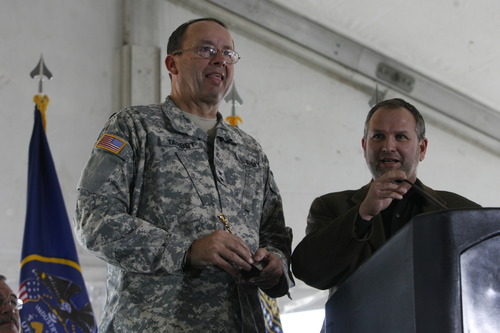This is an archived article that was published on sltrib.com in 2013, and information in the article may be outdated. It is provided only for personal research purposes and may not be reprinted.
Washington • The National Security Agency says electrical problems at its Utah Data Center were not as dire as reported earlier this week, didn't damage any expensive computer equipment and shouldn't delay the opening of the massive storage site.
"Our current assessment is this issue will be fully resolved, mission systems will be installed on schedule, and the project will remain within budget," NSA's director for installations and logistics, Harvey Davis, says in a letter sent to congressional intelligence committees this week. The Salt Lake Tribune obtained a summary and discussion of the letter.
The Wall Street Journal reported earlier this week that chronic electrical surges were hobbling the new $1.5 billion center on Camp Williams in Bluffdale. The newspaper, citing documents and current and former officials, said that fiery "meltdowns" destroyed hundreds of thousands of dollars of machinery and could delay its operation for a year.
The NSA balks at the paper's description, saying the "arc flashes" were discovered during routine testing that occurs before the agency takes possession of the facility by the contractor, and that the problems were localized to breaker boxes.
"The system worked as designed to prevent damage to the very expensive computers downstream from the circuit breaker," the agency says in the letter. "It is important to note that no NSA mission systems were damaged, nor were any additional costs incurred by the government."
In fact, the NSA says, the contractors have agreed to double their warranty to 10 years from five years, provide three years of rapid response in case of further problems and supply a complete set of spare breakers to be stored onsite for immediate repairs.
The Utah Data Center is expected to be the largest of several computer storage centers run by the NSA for the nation's intelligence community and provide a backup to the other centers in Maryland, Texas and elsewhere.
The NSA does not plan to employ analysts at the 1-million-square-foot facility but only about 200 support staff to keep it running. The cavernous buildings are set to consume 65 megawatts of power when fully operational, and draw 1.7 million gallons of water a day to cool the technology inside.
The Tribune reported earlier this week that the center's water needs have been wildly inconsistent, hinting that the operations are not yet completely functional.
The NSA declined to comment on the letter, referring to its previous statement about the issue saying that a project of "this magnitude requires stringent management, oversight and testing before the government accepts any building."
In the letter, the agency noted that it flooded the zone with experts — from engineers, "forensic investigators," researchers, scientists and academics — to identify and fix the electrical problems and "believe we have identified the cause and are implementing the jointly agreed-to solution."
Because the center's electrical system is powerful and complex, the agency says, "this facility has undergone more intensive and focused testing than a commercial building."
A spokesman for the Army Corps of Engineers, which is responsible for building the Utah Data Center, confirmed that problems at the facility are being corrected by the contractors.
"As part of every project, we conduct testing and a thorough review of the project and any supporting utilities as part of turnover procedures with the customer," said spokesman Carlos J. Lazo, who noted that the Journal report was based on a draft assessment of the center's problems and that issues such as electrical problems can arise in any project.
Connie Oliver, a spokeswoman for the consortium of contractors building the project, said the problems uncovered during the testing of the center didn't damage computers or systems, and the government wasn't on the hook for any extra costs.
"As is always the case during testing and commissioning, the contracting team is covering the cost of any needed repairs," Oliver said.
The spokeswoman added that despite previous news reports, the root cause of the problems at the data center has been identified, and a permanent fix is underway.
The contractors on the project include Balfour Beatty, DPR and Big-D.



